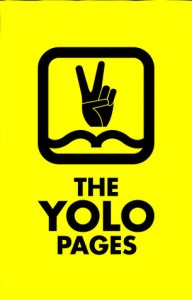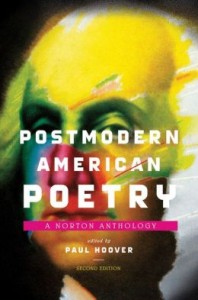Alt WTF (The Yolo Pages)
 The Yolo Pages
The Yolo Pages
Boost House, April 2014
206 pages / $15.00 Buy from Boost House
“Just between the time when one could use one’s age as a power and one uses one’s age as a crutch.” – Jack Spicer (paraphrasing Arthur Rimbaud) from “Homage to Creeley/Explanatory Notes” in My Vocabulary Did This To Me
“Alt Crit” is a term I’m pretty confident I just invented… or at any rate, hope to make some money off of for my own altruistic (see also: poetic) purposes. Everybody knows Poetry with a capital “P” is a negative economy, and that anyone who has nevertheless found a way to sell his or herself as a poet must be a genius at something. Maybe not the actual writing itself, but self-promotion, for example. By editing and publishing this anthology of poems, Steve Roggenbuck, “the first poet to be cataloged as a meme” is finally profiting somewhat from his 18,000 Twitter followers and his slew of YouTube video-monologues about poetry. When I switch on a Roggenbuck video, I feel like I’m watching dust collect on an empty stage; or someone bombing an audition for the high school play over and over again. I can’t ignore it because this is my generation, but then eventually I feel the need to switch it off, so I do.
While attempting to read The Yolo Pages anyway (I did flip through a lot of it, my friend has one…), I got the feeling it could only have been written by one person, most likely our aforementioned “Alt Lit” vlogger maestro. I say this because everything in the book has the same flat, naïve air about it… half-hearted altruism, with a hyper-moralistic identity politics foregrounded at all times. This gets old fast. There is no articulate political stance here (beyond this claim that being Vegan and straight-edge is going to somehow save the world) and no formal invention on the page whatsoever. These are mostly un-ironic lyrical poems with titles like “Accept Me.” There are some cute typos intentionally thrown in every once in a while too, as ornament.
Contributors like Andrew W.K. are in the book clearly for their fame-generating potential. K. Silem Mohammed is in it because he’s a venerable older poet and seems like a nice, charitable person. Ditto Sharon Mesmer. I happen to like Patricia Lockwood’s poetry as well, but she’s poorly represented by this selection of her Tweets… why not print excerpts from that poem of hers that went über-viral last year? Has that poem ever even appeared in print before? As his influences, Roggenbuck has cited e.e. cummings, Flarf, Walt Whitman, Jenny Holzer, Roland Barthes, Miranda July, Dada, William Blake, Surrealism, The Beat Generation, The Lost Generation, Generation X, Generation Y, The X-Files and Punk. Whatever it is, his youth is supposed to make it fashionable again. But when someone is being compared to, and/or makes a habit of comparing themselves to pretty much everything that has happened before in their medium, it becomes impossible to take an objective look and make any decision as to whether you even like it or not. You have to like it, or else you run the risk of being called out as a h8r.
Like Nardwuar, Roggenbuck is basically a hype man…another fan boy for contemporary poetry, the perfect gadabout and Web 2.0 chameleon. The videos are amazingly solipsistic for a guy who claims to be starting a morally righteous collective (privately funded by Kickstarter, of course). The bookstore of the future is opening its doors, and he’s determined to make a job for himself there. Like Pharrel, he’s probably much better off producing other people’s work than making any of his own, and he’s all about being avant-happy. I would like his videos more if he interviewed people like Nardwuar does. He could interview poets, or strangers on farms in rural Michigan, and ask them what they think about poetry. That might be a little more compelling. The strangest thing about the videos is the chintzy music in the background, which makes the work eerily reminiscent of the corporate advertisements for those expensive iDevices that allow it to happen and be distributed so widely.
If this is supposed to be an alternative, why even do a print book in the first place? On the inside cover, there’s just a bunch of social media addresses for where to send a letter, if you care to know where Boost House printed this book. There is also a very peculiar ellipsis in the middle of that James Baldwin epigram at the front, which makes me wonder if the quote is correct. They don’t even note where it comes from, because of course it comes from the Internet. Roggenbuck is a clever opportunist who knows there is a vacuum outside the walls of the MFA debt factory that needs to be filled with something… but you can’t fight vacuity with even more vacuity and paper wasting. Where are the ecologically minded poets of yesteryear? Are they seeing this? It’s enough to make a young poet run scared back to the classroom to grip that MFA degree pronto. Some maniacal workshop teacher right now is probably screening Roggenbuck videos for their students as an object lesson: “Thinking of dropping out? Well, you might end up like this…” So in that way, he has (ironically) already allowed himself to be assimilated as a booster for the very system he would have us believe he is railing against.
The Yolo Pages is not Alt Lit, meta-modernism, emo, homespun, “new sincerity” or “uncreative writing.” It’s all much too aspirational to be any of those; it’s more like some new kind of ineffective self-help poetry. So actually, it’s a lot like America’s once-favorite poncho-wearing poet and translator Robert Bly, with his whole Iron John thing, where men went out together shirtless to the woods so they could help each other bang on drums and recuperate their masculinity. Wasn’t that embarrassing enough? “Young Adult” poetry might be a better, more lucrative fit than Alt Lit. Maybe The Yolo Pages makes people who suffer from extreme logorrhea (online) feel better together. It’s all like this endless rabbit hole you’re being led down, and there’s nothing at the end but a sign that says “thanks for following.”
***
Ben Tripp is on Facebook.
June 5th, 2014 / 10:00 am
Against Intramural Poetics, Poetry as Potpourri and Brooklyn Provincial: Josef Kaplan’s Kill List
 Kill List
Kill List
by Josef Kaplan
Cars Are Real, October 2013
58 pages / Available as PDF / Print Editions $15
It’s been a big year for lists in poetry. I don’t feel at all threatened or the least bit offended by Josef Kaplan’s most recent Kill List. In fact, it’s hard for me to believe anyone out there really would be. Flavorwire and Seth Abramson offended me much more. But of course, I am an oh-so jaded rich poet myself, and it’s the grandmas and granddads of U.S. Conceptual Poetry who have jaded me already. I have one urgent critique of Kaplan’s poem: and it’s that the work comes off as didactic, transparently so. And to argue for this transparency as a virtue in itself undermines the integrity of conceptualism as a vanguard movement worth rooting for in contemporary poetry. Maybe I care too much. But why not make the poem a hundred pages longer? Slam Poetry is similarly didactic…something like Elliot Darrow’s “God Is Gay” which was written up in Time magazine earlier this month. Both Darrow and Kaplan espouse a kind of viral poetics to provoke discussions about classism, racism/sexism etcetera. Darrow is a high-school thespian in North Carolina; Kaplan is part of a comfortable community of poets living in Brooklyn, N.Y. With Kaplan, it’s a witty uncreative self-awareness sharpened to a lethal edge. It’s a necessary prank, a deliberate faux pas; a pot shot at our naked emperor and his provincial court of intramural poesies. But it’s not enough.
The exciting thing Kill List accomplishes is its unique perpetuation across various comment streams and blogs online. In its first week, there have been some hilarious moments of response…one person arguing that so & so isn’t a rich poet because they only recently received tenure and the National Book Award, for instance. Some people are upset. Yes, the romantic idyll of the starving poet in a garret is entirely defunct. The trouble is that if someone is a poet and you know about them outside of your own inter-personal sphere, they’re mostly likely rich, because so much poetry is and always has been (not without the occasional, glorious exception…) for the most part conceived by and for an owning majority class. So much poetry is just like potpourri.
Here’s an attempt at close reading my favorite section of Kaplan’s poem. This stanza appears towards the end on page fifty-eight:
“Ron Silliman is comfortable.
Justin Sirois is comfortable.
Matthew Smith is comfortable.
Patti Smith is a rich poet.”
Patti Smith is a rich poet, no doubt…and an example of the constantly warping conception of what constitutes poetic labor (an oxymoron?) or what makes someone a poet, wtf is poetic. All poetry mocks the bourgeois idea of production, viz.: how much labor must one put into something for it to have any value. Anybody can do it, so therefore any poem is inherently subversive. A poem that’s no more than twenty words may win awards on a grand scale—never mind how long the poet claims it took them to write—just as they could rattle off an epic fifty-page poem in a matter of days. The poet’s “craft” so-called may reside more in their delivery, the cultivation of a persona, or some underlying concept forming the bedrock of everything they do.
Poet John Latta wrote on his blog Isola Di Rifuti in 2009 about “the insidious People-magazinification” of the little avant-garde poetry magazines he was receiving at that time from fellow poets, young and old, new and inveterate:
“[What] is it about this particular moment that sees the arrival of Lana Turner and Abraham Lincoln and Gerry Mulligan? (Trying to think of others, I do recall a Roy Rogers some years ago—and a Frank and a Marilyn and there’s Arshile still, presumably.)
All those magazines were/are still for the most part edited produced and disseminated by respective communities of poets. Needless to say, any layman potential non-poet reader will have a hard time finding them online unless they specify, for instance: “Lana Turner poetry” or better yet “Lana Turner poetry magazine”. And that particular title is a literary reference to an old pop cultural reference…way back to Frank O’Hara, who was indeed commenting outright on the just-as-insidious, albeit irresistible cult of celebrity in the late 1950s surrounding actress Lana Turner with his famous poem about her collapse.
Seth Abramson alluded to this phenomenon of poets preaching to the choir in his introduction to the Top 200 Advocates for American Poetry list on Huffington Post. But his intentions for making this list were unclear. He shot himself in the foot with the disclaimer: “Everyone has their own pantheon of favorite poets, cadres, mentors, and poet-friends…” He encouraged people to add to the list, as long as nobody used it as an opportunity to shamelessly promote their own clique, magazine, university lit department, reading series or borough of New York City:
“…lists of top poets and angry responses to such lists have the same net effect: to define poetry as a series of geographic sub-units or highly-circumscribed sub-communities, all of which are largely self-sufficient and self-contained, and therefore do little to directly promote American poetry as a national cultural phenomenon.”
Abramson’s list did something to promote its’ creator as a national cultural phenomenon, and in an only slightly more provocative way, so does Kaplan’s. Abramson casts himself as Paul Revere in the rapidly unfolding drama of poetry’s survival in the mainstream. The redcoats are the poetry haters. A lot of people don’t care about poetry because a lot of poets don’t care about people who don’t care. Or if they do, their way of caring is by writing poems with titles like “Accept Me” courtesy of their local MFA program.
October 22nd, 2013 / 11:00 am
The Crisis Of Infinite Worlds by Dana Ward
 The Crisis Of Infinite Worlds
The Crisis Of Infinite Worlds
by Dana Ward
Futurepoem Books, May 2013
160 pages / $16 Buy from SPD or Amazon
Once upon a time in the 1990s, I remember my 4th grade class being spoon-fed articles from Time For Kids magazine about how dangerous drugs like ecstasy and MDMA were (“Like taking an ice-cream scoop’s worth out from your young brain!”) and there was this evil thing called a rave. Like your average party, maybe with music and multi-colored lights and everybody dancing, but worse. Like the mythic days of 60s experimentation with hallucinogenics à la professor Timothy Leary, only much more fatalistic. An altogether different hedonism, or what could be called decadence: not even grunge, but a kind of positive nihilism and saying goodbye to the 20th century. These concepts were so far beyond my imagination and/or realm of consciousness at that time, that I wrote it all off as a cautionary tale that didn’t in any way apply to me. Now, flash-forward to the second decade of our new millennium, and I have tried MDMA, but I’ve never been to a rave before, at least none that I can remember…
Dana Ward is an archeologist of these and other esoterica with a poem about Krystle Cole at the proverbial core of his latest full-length book from Futurepoem. VICE Magazine online is currently another go-to source for information about her (short documentary here) but you don’t have to be in-the-know about anything like that to enjoy this poem, or the book. I first read the following verses in a little handsewn magazine made in Brooklyn over a year ago, when the rest of this book was just a glimmer in the author and its publisher’s eye. The poem began the magazine. Here’s a part of the middle:
besieged or like a mask
for separation, they
felt like connection
between us in life but I
didn’t take my allegory
further Krystal Cole, into your
lysergic delirium later redeemed
by a beautiful discipline
of spirit & cosmography
developed for praxis. I liked
your video on candy
flipping hard & developing
telekinesis with friends.
It suggested oneness
was a leavened mix
of random indiscretion,
bruising wariness, & bliss
obtained by synchronizing
chemical encounter [. . .] “
May 31st, 2013 / 11:02 am
The Nation Versus The Norton Postmodern Anthology Disaster (2nd Edition)

RE: Postmodern American Poetry: A Norton Anthology (2nd Edition) / Edited by Paul Hoover / W.W. Norton & Co., March 2013
***
Anthologies serve a plainly economic purpose, if nothing else. Pedagogical too…most teachers and students of poetry—along with its general lovers everywhere—lack the time and/or wherewithal to go out and find so many individual titles on their own. This new Norton edition via Paul Hoover, generously upgraded since the first in 1994, writes Conceptual and Flarf poetry into a Postmodern American narrative that has become desperate for extensions. None of the poets here come off as desperate; the blanket labeling is merely academic. Once outside the classroom it feels very old-hat. But as poet and critic Ange Mlinko pointed out in her already notorious review of this book for The Nation, under what other aesthetic banner can a major publisher have the Zen nature verses of Gary Snyder together with K. Silem Mohammad’s rewritings of Shakespeare via an internet anagram generator?
It’s only been a couple of months since the anthology came out, and already there is a scandal in the works. Poets dig war. The politics/poetics of who gets left in, and who gets taken out, or who gets tacked on to the end remains an uninteresting mystery. Pop outliers like Charles Bukowski have been left out this time around, but the more high-profile writers of the Beat Generation, New York School 1st & 2nd generation(s), Black Mountain Poets and Language School are all given their due throughout these pages, once again. If you don’t know what any of those are, this book will no doubt be indispensable to you. Now the same goes for Conceptualism and Flarf. Flarf has never had its own private anthology (maybe on purpose?) while Conceptualism decidedly has, with Against Expression: An Anthology of Conceptual Writing just two years ago. Nevertheless, of all the poetry groupings/movements in this book, these two are still the most involved in the business of constantly redefining themselves before a potential public.
Will The Real Ben Fama Please Stand Up?
 Mall Witch
Mall Witch
By Ben Fama
Wonder, November 2012
48 pages / $30 Buy from Wonder
Looking back now on the New York poetry world or “scene” in the year of the Mayan apocalypse, it remained, perhaps against all odds, a small one. Case in point: at a poets’ and small press publishers’ party in lower Manhattan I attended last year, somebody introduced me to a person (an older person, just old enough to be on the pre- side of the millennial age gap) who claimed they recognized me or had heard of me somehow via the Internet. They didn’t know my last name, but I had already told them I was a poet. It seemed we were friends on Facebook and had been for a long time. The person got out their smartphone and started scrolling through their contacts list, before asking me in complete earnest: “Are you Ben Fama?” I took it pretty well.
Mall Witch is an illustrated book of poems allegedly written in tandem by the poets Andrew Durbin and Paul Legault, ghostwriting as the poet Ben Fama. At least that’s what I was told, initially. It is the first full-length work to come out of Durbin and Fama’s mercurial publicity project called Wonder. You can read their first manifesto online in which they posit themselves as the reluctant saviors of poetry in our time. They discuss the doom of our Internet-oriented “content farm era” with MFAs, ageism, academic tyranny, and what amounts to a general lack of attention span unanimous today among an assumed readership. Taking such a fatalistic view of the contemporary landscape, they go on to promise Wonder will deliver “one last phase of innovation” or what they call “100% authentic buzz.”
About what exactly? Stylistically, Mall Witch is pure Fama all the way. For fans of Legault’s homespun ventriloquisms of John Ashbery and Emily Dickinson (some from Fence Books, or his latest from McSweeney’s) or Durbin’s precocious Frank O’Hara-style cosmopolitan lyric (Durbin is younger and a late-comer to this coterie, his poems have just begun to appear online and in some print journals) there is none of that here. It makes this reviewer truly wonder who or what actually did write Mall Witch, or what the point of any such alternative methods for the book or “buzz” really is, if all that comes out on the page in the end is the same anyway.
February 8th, 2013 / 12:00 pm
